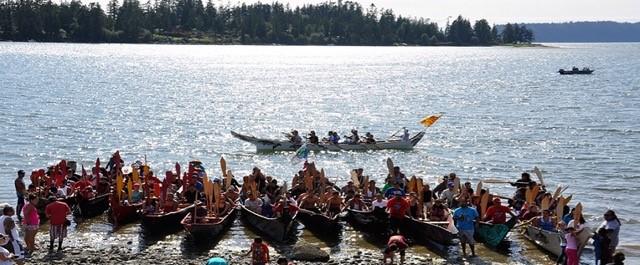
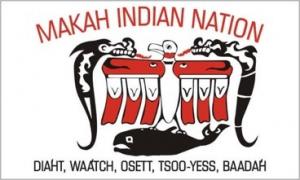
History of the Division of Rheumatology and Native American Health
Written by Dr. Gregory Gardner, professor, Division of Rheumatology.
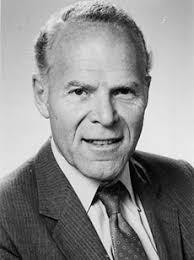 Dr. Robert Willkens, a nationally prominent rheumatologist and UW faculty member, was contacted by a member of the clinical staff at the Yakama Nation clinic in Toppenish Washington regarding the number of patients with lupus that they were seeing in the clinic.
Dr. Robert Willkens, a nationally prominent rheumatologist and UW faculty member, was contacted by a member of the clinical staff at the Yakama Nation clinic in Toppenish Washington regarding the number of patients with lupus that they were seeing in the clinic.
Dr. Willkens made a visit to the clinic and recognized that it wasn’t lupus but rheumatoid arthritis.
Many of the patients with rheumatoid arthritis were indeed ANA positive but had clinical and serologic manifestations of rheumatoid arthritis. Subsequently, Dr. Willkens organized regular treks to the Toppinish clinic to see the multitude of Yakama RA patients.
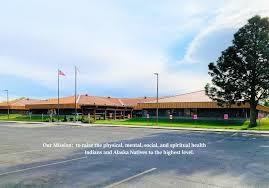 The group included Pete Toomey, a local orthopedic surgeon, and all the fellows, residents, students, and junior faculty that he could muster. The visits also included required stops at a greasy spoon in Ellensburg, Washington for a large, high calorie, American breakfast and lunch at the local tortilla factory in neighboring Zillah, WA.
The group included Pete Toomey, a local orthopedic surgeon, and all the fellows, residents, students, and junior faculty that he could muster. The visits also included required stops at a greasy spoon in Ellensburg, Washington for a large, high calorie, American breakfast and lunch at the local tortilla factory in neighboring Zillah, WA.
We would often see 70 to 100 patients in a day and get home late in the evening after having left around 6 AM in the morning. A post-clinic required stop during the summer included a visit to a local fruit stand.
Dr. Willkens published three different papers on his experience with the Yakama Nation clinic including a paper, published in 1973, on the prevalence of rheumatoid arthritis in the Yakama (1).
The prevalence was found to be 3-4 times the general population risk for RA. He was also lead author on two papers exploring the HLA typing of the Yakama as this was the hot topic at the time (2,3). The first paper published in A&R in 1982 reported the non-HLA DR4 association of RA in the Yakama but the follow-up study published in 1991 also in A&R, reported that a rare HLA Dw16 gene was associated with RA in this group but it contained the shared epitope sequences found the HLA DR4 gene associated with RA in the general population.
After Dr. Wilkins retired, Dr. Mark Wener became the point person for our efforts at the Yakama nation clinic and also continued the cherished tradition of usual culinary activities. Because of the requirements of patient care and economic constraints at the University of Washington, our involvement with the Yakama clinic faded by about 2005 but one of our VA faculty members, Dr. Wendy Eider, took up the cause in 2010 and provided regular rheumatologic care to the Yakama people until her untimely death in 2016.
Around 2008, Dr. Dedra Buchwald from Harborview Medical Center, 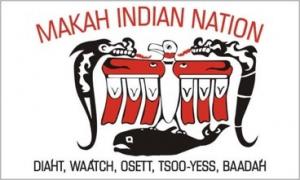 who had been doing clinical research with a variety of Native American groups in the state, reached out to me to see if I would be interested in going to see patients at the Makah Nation clinic in Neah Bay, Washington. Neah Bay is close to cape Flattery, the furthermost west one can go in the continental US.
who had been doing clinical research with a variety of Native American groups in the state, reached out to me to see if I would be interested in going to see patients at the Makah Nation clinic in Neah Bay, Washington. Neah Bay is close to cape Flattery, the furthermost west one can go in the continental US.
The Sophie Trettivick tribal clinic in Neah Bay is named after a local RN who pioneered health care for the Makah Nation. We were told 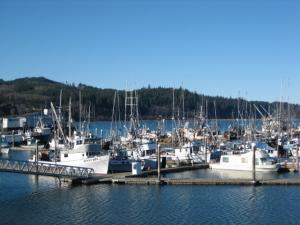 that they had many patients with rheumatoid arthritis and that they had a very difficult time getting appropriate care because of distance and funding.
that they had many patients with rheumatoid arthritis and that they had a very difficult time getting appropriate care because of distance and funding.
I started going out to the clinic in 2010 and I continue to go to Neah Bay approximately every six months. I was struck by the number of patients with advanced RA and seized the opportunity to provide RA medications beyond prednisone and narcotics. I typically see between 30 and 40 patients over a two day visit and note that RA prevalence in the 1200 registered Makah is also 4 -5 times reported general population rates.
I have also been impressed that the disease tends to run in families within the tribe, an observation pointed out to me several years ago by Hani-Al Gabalawy, a Canadian rheumatologist who works with First Nations people in Canada.
The name Makah means people who are generous with food. That is true for outsiders like me as well. I always seem to come away from my every 6-month visits with some fresh frozen halibut or a coveted jar of smoked salmon.
The visits have been generously funded and have helped support our fellowship program and provide this faculty member a chance to get some fresh air and hear the sound of the waves.
In 2013, an RN who was working at the lower Elwha Klallam clinic in Port Angeles, Washington who is from Neah Bay and whose mother 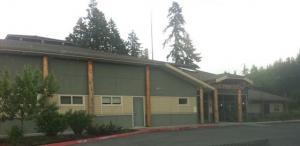 was one of my patients in Neah Bay, arranged for me to come and give a talk at the Port Angeles clinic to the providers and staff.
was one of my patients in Neah Bay, arranged for me to come and give a talk at the Port Angeles clinic to the providers and staff.
The Lower Elwha tribe is one tribe of 4 different Klallam peoples who speak the Salish language and live on the Kitsap and Olympic peninsulas. From that initial talk came another opportunity to travel to see patients on a regular basis and our involvement with this tribal clinic began in 2014. Visits are made every 4-6 months. The clinic is open to a few non-Native American patients as well.
In 2016 I contacted the Portland Indian Health service office of the Indian Health Service, which directs the activities in the IHS Northwest region.
I was interested in finding out if there was widespread interest in having rheumatologists attend local IHS/tribal clinics. The physician 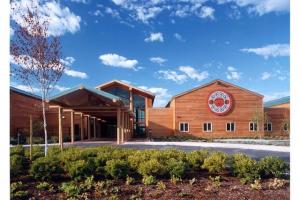 administrator with whom I spoke sent a general message out to all the units in the area and identified the Tulalip tribe as a group that would be very interested in having a rheumatologist attend their clinic.
administrator with whom I spoke sent a general message out to all the units in the area and identified the Tulalip tribe as a group that would be very interested in having a rheumatologist attend their clinic.
Dr. Ingeborg Sacksen agreed to be the point person for the Tulalip effort and has been going to the clinic on a regular basis.
Because of its proximity to Seattle, fellows have been attending this clinic beginning in 2020. Visits are generally every other month and Dr. Sacksen brings the added benefit of musculoskeletal ultrasound to the Tulalip care.
The Tulalip people constitute one of the largest native American tribes in the Northwest and live around Tulalip Bay. The clinic actually has a wonderful view of the bay especially from the dental clinic and I am sure this reduces some of the pain caused by seeing the dentist.
In 2020 we were contacted by physicians at the Lummi nation clinic near Bellingham, Washington to start the process of discussing rheumatology visits to their clinic as well. We are currently in discussions to provide services to this group of Native Americans who live around Lummi island and Bellingham area.
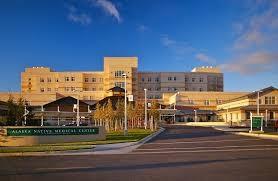
Dr. Elizabeth Ferucci, one of our affiliate Division faculty members working at the Alaska Native Medical Center in Anchorage since 2008, has been very involved in Native Alaskan rheumatology health and research.
She has been the Principal Investigator for the CDC-funded Indian Health Service Lupus Registry which reported high prevalence and incidence of SLE in Native Alaskans (4).
She also has an ongoing collaboration with the University of Manitoba, working on a study of first-degree relatives of Alaska Native and First Nations people with RA. She has been the Principal Investigator for the ANTHC Native American Research Centers for Health Care with a focus on health care disparities in Native Alaskans and encouraging the pursuit of health care careers by Native Alaskans.
In 2016, Drs. Ferucci and Gardner participated in a symposium on Rheumatology Care in Native Americans/Native Alaskans at the American College of Rheumatology national meeting held in Washington, D.C.
I am hoping our involvement in Native American health will continue and even expand and this timeline will continue.
Our Native American neighbors have a considerable rheumatologic disease burden and often have poor access to rheumatology care. They are kind, grateful, and welcoming. Those of us who have had the privilege of involvement in this effort cherish the opportunity.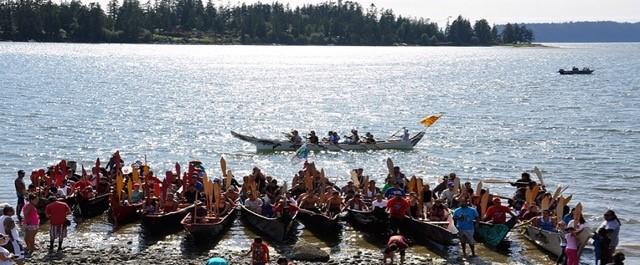
References:
- Beasley RP, Willkens RF, Bennett PH. High prevalence of rheumatoid arthritis in Yakima Indians. Arthritis Rheum. 1973 Nov-Dec;16(6):743-8. doi: 10.1002/art.1780160607. PMID: 4796580.
- Willkens RF, Hansen JA, Malmgren JA, Nisperos B, Mickelson EM, Watson MA. HLA antigens in Yakima Indians with rheumatoid arthritis. Lack of association with HLA-Dw4 and HLA-DR4. Arthritis Rheum. 1982 Dec;25(12):1435-9. doi: 10.1002/art.1780251208. PMID: 6983355.
- Willkens RF, Nepom GT, Marks CR, Nettles JW, Nepom BS. Association of HLA-Dw16 with rheumatoid arthritis in Yakima Indians. Further evidence for the "shared epitope" hypothesis. Arthritis Rheum. 1991 Jan;34(1):43-7. doi: 10.1002/art.1780340107. PMID: 1701997.
- Ferucci ED, Johnston JM, Gaddy JR, Sumner L, Posever JO, Choromanski TL, Gordon C, Lim SS, Helmick CG. Prevalence and incidence of systemic lupus erythematosus in a population-based registry of American Indian and Alaska Native people, 2007-2009. Arthritis Rheumatol. 2014 Sep;66(9):2494-502. doi: 10.1002/art.38720. PMID: 24891315; PMCID: PMC4617772.